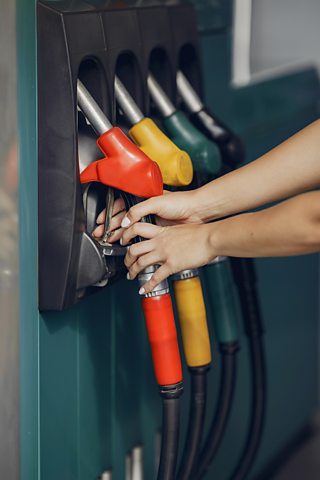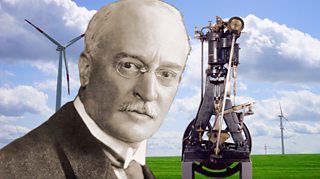Is it worth paying more for premium petrol?
Premium unleaded petrol promises us more – but is it worth the higher price? Listener Irfan wants to know if premium petrol can really make your car more efficient, take you further and clean out your engine. And will it also extend the life of his new hybrid car?
For 91热爆 Radio 4's Sliced Bread, Greg Foot drives the investigation into unleaded petrol. He looks at what's changed since we moved our standard from E5 to E10, what additives make premium special and what the implications are for our carbon footprint. All to answer the big question: is it really worth splashing out more for premium branded super fuels?
Here's everything Irfan needs to consider when he's next picking his pump…
1. Regular petrol is generally the greener option
At the unleaded pumps you'll normally see two options: regular, or E10, and a premium option labelled E5. E10 means there is 10% ethanol in the fuel mix; E5 means 5%.

If you only look at mileage per pound, the premium shouldn't have any advantage.Dr Guohong Tian, automotive engineering scientist
The majority of ethanol is produced from fermenting starchy foodstuffs like corn or sugarcane. And because it's a biofuel, it has a lower carbon footprint of production than petrol, which comes from crude oil: "When the biomass is grown it can absorb some CO2 into the plant, therefore the footprint is a bit less than burning petrol," explains Dr Guohong Tian, a Research Scientist in Automotive Engineering. However, he admits it's more complicated than that. If forest has been cleared to grow the crops then the carbon emissions involved in that can cause ethanol to lose its slightly more eco edge. "But, in general, I think it's safe to say burning biofuel is greener than petrol," states Guohong.
It's why regular petrol, which used to be E5, was switched to the apparently greener E10 at the end of 2021, and E5 (with some additives put in the mix) became the more expensive premium option.
It's worth noting that some of the additives in E5 can also help reduce emissions, which could even out the 'greener'.
2. The octane number is most relevant if you have a high-performance car
Unleaded pumps also show an octane number. Regular petrol is octane 95; premium is 97. "It indicates the fuel's anti-knocking characteristics," explains Guohong.
'Knocking' is an abnormal combustion phenomenon that can damage the engine. A higher octane number means the fuel is less likely to cause knocking and damage.
"If the engine is designed to be compatible with 95 petrol, you can use 95 no problem at all," says the expert. But if the engine is designed for a higher-octane number – like in high performance cars – it's probably better to stick with 97 and plump for premium.
3. Regular petrol provides fewer miles per gallon – but any difference in the cost per mile is likely negligible
Many people have reported a drop in their miles per gallon with the new regular E10 petrol. This is because ethanol has a lower 'heating value': for the same amount of fuel, you get less heat released. E10[s higher ethanol percentage means it can give you fewer miles per gallon than E5.
But the margins are small: "I would say the difference that will make in terms of mileage is probably around 1% or even less," suggests Guohong. "If you only look at mileage per pound, the premium shouldn’t have any advantage."
4. Regular petrol might offer more power
"What limits the power is how much air can be inducted to the cylinder, rather than how much fuel you can deliver. Usually ethanol delivers slightly higher efficiency," says Guohong. So regular fuel might actually provide more power than premium petrol, despite claims to the contrary.
However, there are additives in premium petrol that can promote combustion. The fuel injection system in your car's engine can 'foul up' with carbon over time, which can reduce the efficiency of the engine, explains automotive engineer Keith Howard. Premium petrol contains detergents which can get rid of that muck. "You can actually see the difference on the injector tip if you look at that under a microscope," he says.
5. You can add detergents to regular petrol to improve efficiency
However, you can add the same detergents that you find in premium E5 to a tank of cheaper, regular E10 petrol to clean up the injectors every once in a while, says Keith. You've just "got to be careful that you buy genuine stuff that will do the job".
Alternatively, if you normally run on regular, just opt for a tank of super unleaded every once in a while to give the engine a clean: Or as Keith says: "Put a tankful in every few months."
6. Age matters
Not all cars are compatible with E10 petrol. "Modern cars – after about 2010, 2011 – are basically designed to run on ethanol blends. Older cars are not, so they may contain some polymer materials that are susceptible to the ethanol," explains Keith. Ethanol can attack parts within your engine such as rubber hoses and seals.
So, if your car is older, opt for premium.

'Brands claim they deliver more power'
Dr Guohong Tian debunks marketing myths about premium petrol.
7. Premium petrol won't improve the performance of a hybrid car
The cycle in a hybrid engine – which can run on fuel as well as electricity – optimises fuel economy rather than power. There's no particular benefit in using premium petrol in a hybrid compared to a standard petrol car.
It's more important to get your car serviced properly and it's really important to use the right engine oil.Keith Howard, automotive engineer
"You certainly wouldn't need it for the performance part," says Keith. "You get the same benefits from keeping the fuel injection system and the valves clean from the additives in premium unleaded though."
8. Regular servicing and fresh oil are more important than fuel type
"If you have a high-performance car, and you want to keep your engine in tip-top condition for the long run, then premium fuel is probably worth it," says Keith. "Also, if you have an older car that cannot run on 10% ethanol, then premium fuel with 5% ethanol is obviously a must-have.” But for running a standard petrol engine, it's a luxury, he says. "You might want to put the occasional tank of premium unleaded in to help clean things out, but running on it week in, week out – maybe not."
Guohong agrees. It's down to the individual whether they want to spend 10% more on fuel for potentially less than half a percent more mileage. "If my engine is happy with the regular fuel, that’s what I would go for."
What does matter is regular servicing, states Keith. "It's more important to get your car serviced properly and it's really important to use the right engine oil and get that changed on a regular basis."
To hear Greg's full findings and learn whether Irfan is going to go super unleaded or stick with regular petrol, listen here.
The information contained in this article was correct at the time of broadcast on 26 January, 2023.
-
![]()
Why diesel engines could have been so, so different
91热爆 Ideas tells the tragic tale of Rudolf Diesel.

More articles from Radio 4
-
![]()
How did e-cigarettes and vaping get so popular?
The past, present and future of vapes and e-cigarettes
-
![]()
Electric cars: Eight things you need to know
Will swapping your petrol car for a new electric vehicle make you greener?
-
![]()
What are the benefits of 'eccentric excercise'?
The secret workout that's been hiding in your routine all along.
-
![]()
Do our skincare products stand up to scrutiny?
Greg Foot tests if the claims made on the packaging are more than just marketing hype.






